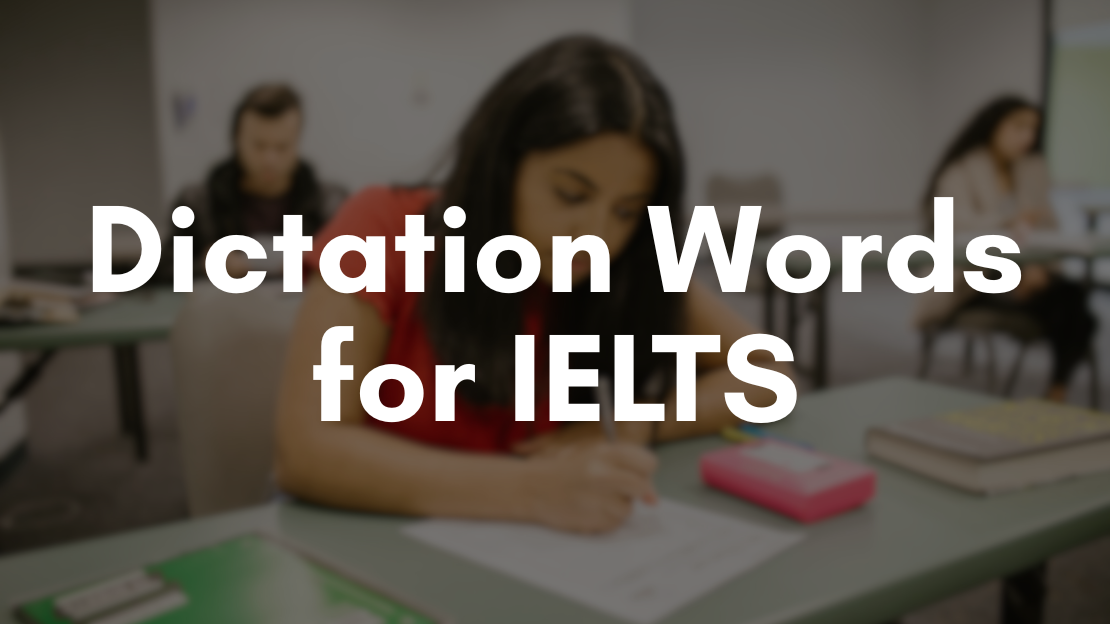 When preparing for the IELTS exam, strong listening and writing skills are essential for achieving a high score. One important but often overlooked practice method is using dictation exercises. Dictation improves both your listening comprehension and your spelling accuracy, which are crucial for the IELTS test. Many students who are preparing at an ielts ahmedabad training center use dictation exercises as a daily part of their study routine. In this blog, we will explore why dictation is important, how to practice it effectively, and which words you should focus on.
When preparing for the IELTS exam, strong listening and writing skills are essential for achieving a high score. One important but often overlooked practice method is using dictation exercises. Dictation improves both your listening comprehension and your spelling accuracy, which are crucial for the IELTS test. Many students who are preparing at an ielts ahmedabad training center use dictation exercises as a daily part of their study routine. In this blog, we will explore why dictation is important, how to practice it effectively, and which words you should focus on.
Why Is Dictation Useful for IELTS Preparation?
Dictation exercises train your brain to listen carefully, process language quickly, and reproduce it accurately in writing. This practice is especially helpful for the Listening and Writing sections of IELTS.
Here’s why dictation is so effective:
- Improves Listening Accuracy: You learn to pick up specific words and phrases more easily, even when spoken quickly.
- Enhances Spelling Skills: Correct spelling is crucial in IELTS because even a small spelling mistake can cost you marks.
- Boosts Concentration: Dictation forces you to focus intently, which is a vital skill during the real exam.
- Builds Vocabulary: You get exposed to a wide range of academic and everyday vocabulary used in IELTS contexts.
How to Practice Dictation for IELTS
Practicing dictation is simple and doesn't require any expensive tools. Here’s a step-by-step guide:
- Choose a Recording: Select a recording from IELTS practice materials or an English podcast.
- Play and Pause: Play a small section (one or two sentences) and pause. Try to write down exactly what you hear.
- Check and Correct: Compare your writing with the transcript (if available) and correct any mistakes.
- Repeat Regularly: Even 10-15 minutes of daily dictation practice can lead to big improvements over time.
You can also ask a friend to read sentences aloud while you write them down, simulating a real exam environment.
Dictation Words You Should Practice for IELTS
Here’s a list of types of words you should focus on during your dictation practice:
1. Common IELTS Vocabulary
- Environment
- Education
- Technology
- Government
- Development
- Society
- Research
- Employment
- Culture
- Health
2. Numbers and Dates
- Twenty-one
- Thirty-five
- Nineteen eighty-four (1984)
- The twenty-third of April
Numbers and dates are often used in Listening tasks, and you must write them correctly.
3. Academic Words
- Analyze
- Hypothesis
- Theory
- Assessment
- Interpretation
Academic vocabulary is essential for IELTS Academic Writing and Reading sections.
4. Everyday Words
- Appointment
- Groceries
- Reception
- Address
- Reservation
These words frequently appear in Listening sections related to everyday conversations.
5. Difficult-to-Spell Words
- Accommodation
- Necessary
- Separate
- Definitely
- Government
Spelling mistakes can easily reduce your IELTS score, so mastering tricky words is important.
Tips for Better Dictation Practice
- Start Slow: In the beginning, choose slower recordings to get used to the process.
- Gradually Increase Speed: Move on to faster, natural-speed recordings as you improve.
- Focus on Punctuation: Try to include commas, periods, and question marks when practicing.
- Practice Accents: Expose yourself to British, Australian, and American accents as all of them can appear in the IELTS exam.
- Record Yourself: Listen to your own dictations and identify areas where you need improvement.
Conclusion
Practicing dictation words for IELTS is one of the simplest yet most effective ways to boost your listening, spelling, and writing skills. It can help you become more confident and accurate, which is essential for securing a higher band score. Whether you're studying on your own or attending an ielts ahmedabad training program, adding dictation to your daily practice routine can make a big difference in your performance.
FAQs
1. How can dictation help improve my IELTS Listening score?
Dictation trains your ears to catch words more accurately and improves your ability to write them correctly, which is essential for scoring higher in the Listening section of IELTS.
2. How often should I practice dictation for IELTS preparation?
It’s best to practice dictation daily for at least 10-15 minutes. Consistent practice helps improve both listening comprehension and spelling accuracy over time.
3. What type of audio should I use for IELTS dictation practice?
You should use IELTS practice recordings, English podcasts, news broadcasts, or TED Talks. Make sure to include a variety of accents like British, Australian, and American English.
4. Should I focus only on difficult words during dictation practice?
No, you should practice a mix of everyday words, academic vocabulary, numbers, dates, and tricky spellings to prepare for all types of questions you may encounter in the IELTS test.
5. Can dictation practice help with the IELTS Writing section too?
Yes, dictation improves your spelling, grammar, and sentence structure, all of which are important for writing clear and accurate responses in the IELTS Writing section.


